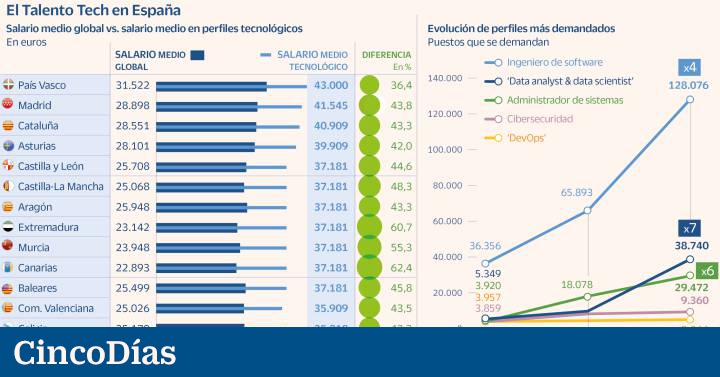Professionals who occupy positions related to information technology (IT) in Spain earn an
average salary of 37,660 gross euros per year
.
The national average stands at 26,500 euros.
This translates into a difference of more than 11,000 euros, that is, a 42% higher salary in the case of technological profiles, as indicated this Tuesday by the director of operations of Experis, Fernando Aguilar, in the presentation of the
Tech Cities 2021
study
, which your company has prepared together with the DigitalES technological employer and with the support of the Secretary of State for Digitalization and Artificial Intelligence.
In this third biannual report from the consulting firm, it is also confirmed that the salary of technological profiles is not only higher than the average, but is also growing faster. “From two years to now, the increase in the average salary in technological positions
has risen 2,000 euros compared to the 1,000 euros that the average Spanish salary has risen
. Therefore, we are talking about positions whose demand doubles every two years and whose salary increases considerably ”, Aguilar explained.
This increase in
demand has exceeded 212,673 positions
in 2021, compared to 113,776 in 2019 and 55,099 in 2017. The coronavirus has had a lot to do with it, according to the director of operations, since although digitization and automation fell within the strategic plans of many companies, it is the health crisis that has turned them into urgent needs that must be present in all types of sectors.
It is not the only thing that has changed in the wake of the pandemic. Currently,
43% of technological job offers are concentrated in Madrid
, which is understandable when demand is closely associated with where the bidding company is located. However, teleworking has produced a delocalization that allows a change in trend. "It is not that it no longer matters in which part of the office or at home you sit to work, it is that today it does not matter in which part of the world you do it," said Aguilar.
Being able to choose that part of the world can be a great opportunity for Spain and many Spanish regions that want to attract the much sought after talent of these profiles. In fact, despite the evidence of better pay, the welfare factor also weighs heavily in deciding which organization to choose. The Director of Software Factory of the DIA Group, Inmaculada González, has ensured that, now that it is increasingly easier to decide where to work from, Spain is becoming a very competitive place: “It is not just a salary issue, it
is a quality issue of life and conciliation
.
I want to have time to work, to train and to enjoy my life outside.
Spain has an opportunity as a place to locate that technological talent because it is true that the quality of life here is great ”, he said.
Your demands
The new danger, therefore, is that national professionals work from Spain for foreign companies where working conditions are better. The demand is huge, but the supply is still small, and this mismatch allows the demands of IT profiles to be listened very carefully by employers. “Candidates are asking us for a professional project that is alienated with their lifestyle: a
lot of flexibility, many development plans, and they are increasingly asking for an inclusive and diverse organizational culture
. They seek equality and that the company is committed to projects that truly contribute sustainability to society ”, commented the director of internal transformation of Fujitsu, Virginia Cuevas.
In Spain, according to the report, the most demanded are professionals specialized in Cloud Architecture (with 56,000 positions), SAP consultants (34,000) and Java Developer (32,400), who account for 50% of new job offers. They are followed by specialists in Systems Administration (29,500) and Data Analysts (27,300). However,
only 20% of students decide to pursue careers in this field
compared to 28% on average in the European Union. "We have to do a reflection exercise to see how we encourage our young people to join and decide to go towards more technological careers," Cuevas acknowledged.
For Deloitte's head of human resources, Maite Larios, the ruling has occurred since childhood. “We do not have the teachers prepared to assume the rhythm and teach in such an agile way as is being demanded. Not just in universities and VET centers anymore, even children are outpacing teachers in many areas. If we make it attractive from schools and we get teachers to be well trained, all of this has to be accelerated a lot ”, he confessed. Meanwhile, 11,000 euros more a year is an incentive that can convince many.


/cloudfront-eu-central-1.images.arcpublishing.com/prisa/7BBFZMHM2JDPJH25TGODT4ZBT4.jpg)






